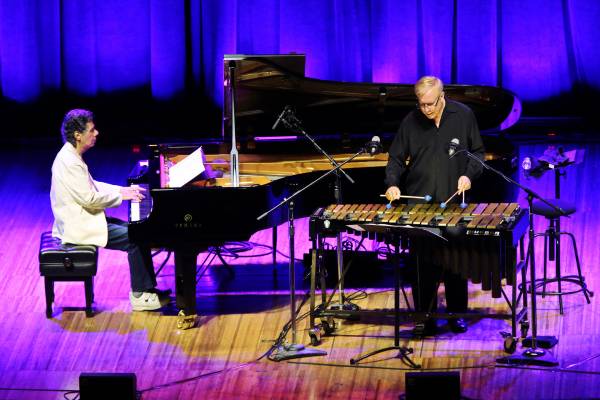Concert Hall, June 10

Chick Corea and Gary Burton have been playing together for 43 years. Other jazz musicians may have clocked up similar feats of collaborative longevity in group contexts, but no one holds a candle to them in a duo, the most intimate of improvising relationships.
This rapport was evidenced not so much in the dazzling soloing as in the accompaniment: both knew just how much to feed each other for the muted sparks to fly. If the term “chamber jazz” has any meaning it probably finds its apotheosis in these intricately distilled dialogues between Corea’s piano and Burton’s vibraphone. They are exquisitely refined, like porcelain wares one might hold up to help define “civilised”.
The half of the material not penned by Corea ranged from 1929’s Can’t We Be Friends to Eleanor Rigby, via standards by Dave Brubeck, Tadd Dameron, Antonio Carlos Jobim and Thelonious Monk. All were shrink-wrapped into similarly elegant packages.
Standing out, as ever, was Corea’s Crystal Silence, and those two words sum up the prevailing aesthetic. This is jazz on the edge of being sanitised into cool, pristine, soothing predictability. Yet it is saved by both players’ lavish musicality and a certain blitheness of spirit, encapsulated in Corea’s dancing touch at the keyboard and Burton’s buoyant swing and round sound.
The quixotic arrangement of Eleanor Rigby offered more drama and contrast than most pieces, including in the solos, with Burton skating across Corea’s undulating accompaniment and the latter unleashing his typically bustling, super-melodic lines. More of this relative daring would have been welcome.
On one level Corea can seem very contained in this context, and yet he was equally at home in the wildly disparate worlds of mimicking Mozart (on his own Mozart Goes Dancing) and interpreting Monk.
They finished with something of a Marx Brothers routine: both playing the vibraphone on Corea’s Armando’s Rhumba. That shared sense of humour has probably been as important as the shared love of mellifluousness in their long musical marriage.